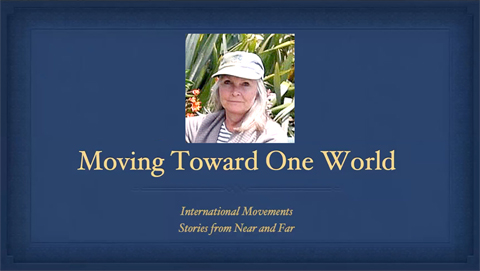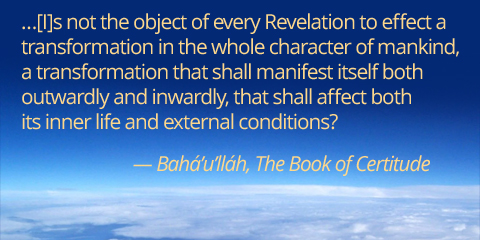 |
 |
|
January 12, 2022 Becoming One People: Local and Global Stories At so critical an hour in the history of civilization it behooves the leaders of all the nations of the world…[to] reshape the machinery of their respective governments according to those standards that are implicit in Bahá’u’lláh’s supreme declaration of the Oneness of Mankind… — Shoghi Effendi, The World Order of Bahá’u’lláh (1931) 
Shoghi Effendi was the Guardian of the Bahá'í community and its appointed leader from 1921 until his death in 1957. The above quotation, in an age of climate change and global pandemics, sounds with even greater urgency than in the between-wars world. He invoked the central principle of the Bahá'í Faith’s Founder, Bahá’u’lláh, and which recently highlighted a “Big Ideas” presentation by Cynthia Farrell to over 60 online auditors. Farrell embraced Bahá’u’lláh’s challenge -- “Let your vision be world-embracing, rather than confined to your own self” – as a post-graduate student in a far-off land. She spent much of her career in international development and education, serving on nearly every continent. In her talk, “Moving Towards One World,” she traced humanity’s growing consciousness of its unity: first, via the spread of ideals and institutions that foster oneness, and by sharing stories of individual and localized progress. The 20th-century growth of global institutions goes beyond the United Nations and the International Court of Justice. In 2021, the COP26 United Nations Climate Conference negotiations received worldwide attention; less heralded was an initiative to establish a minimum corporate tax rate. 136 countries have signed on to “this fairer and simpler system”, including all the G20 countries, a major step towards economic justice in an interdependent world. Earlier, the 2005 United Nations World Summit codified the international “responsibility to protect” those populations at risk of genocide and other crimes against humanity. There must be limits to state sovereignty in a healthy planetary order. There have been many other movements that were established in this direction: the Marshall Plan for rebuilding Europe after the Second World War; the disintegration of the colonial era; the creation of the United States Agency for International Development, the Canadian International Development Agency and other development agencies; the formation of the European Union and the World Health Organization; and currently, the rising tide of humanitarian responses to global suffering from tsunamis to droughts due to climate change.  However, a growing consciousness of the oneness of humanity is not only found in large organizations. Farrell’s own experience offers local, often individual examples of a “world-embracing vision”. She worked with an international/local partnership in Amhara, Ethiopia, that aided 40,000 poverty-stricken people to develop sustainable ways of making their living. In the remote highlands of Papua New Guinea (PNG), a similar project was implemented to create sustainable livelihoods, rehabilitate the ecosystem and ensure food security after a gold mine’s closure. In PNG, Farrell experienced one of the world’s most lively and effective Bahá'í communities. As do Bahá'ís everywhere, the Papua New Guinea Bahá’i community pursues four ways of engaging their fellow citizens in grassroots “civilization-building”: children’s moral education, empowering junior youth for service, education and training for community enrichment, and local gatherings for prayer, meditation and spirited conversation. Bahá'ís everywhere have sought to actualize, in neighbourhoods and villages, Bahá’u’lláh’s statement that “the Earth is but one country, and mankind its citizens.” Practical improvements and programs of education are aided by what Farrell calls “elevated conversations”. One began at “the end of the road” in the northwestern fjords of Iceland in the1940s, when a remote family of bookbinders received a single copy of the first Icelandic translation of Bahá’u’lláh and the New Era, the classic introduction to the Faith. A young child of that family, decades later, encountered the Bahá'í Cause again and was instrumental in the growth of the Icelandic community which attracted a Canadian graduate student – Cynthia Farrell! She contrasted “elevated conversations” with “small talk,” which is not only boring but also a drag on our mental health. Consider a Washington Post article from 2021: “Behavioural science research consistently finds that the more deep and intimate conversations people have…, the happier they are….” The Bahá'í community systematically encourages such neighbourhood conversations, and also participates actively at the United Nations and other forums of “world-embracing” vision and practice, helping to advance the emerging global conversation on oneness. Farrell concluded her presentation as she had begun it, invoking a potent question of Bahá’u’lláh’s that she put forward as a mighty conversation-starter: …[I]s not the object of every Revelation to effect a transformation in the whole character of mankind, a transformation that shall manifest itself both outwardly and inwardly, that shall affect both its inner life and external conditions? — Bahá’u’lláh, The Book of Certitude |
|
|